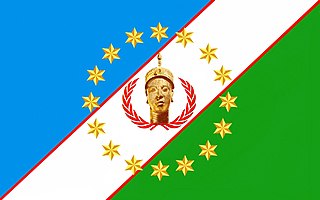
Hausa is a Chadic language that is spoken by the Hausa people in the northern parts of Nigeria, Ghana, Cameroon, Benin and Togo, and the southern parts of Niger, and Chad, with significant minorities in Ivory Coast. A small number of speakers also exist in Sudan.
Russian(s) refers to anything related to Russia, including:

Olorun is the ruler of the Heavens in the Yoruba religion. The Supreme Deity or Supreme Being in the Yoruba pantheon, Olorun is also called Olodumare, Eledumare and Eleduwa/Eledua.

Orishas are divine spirits that play a key role in the Yoruba religion of West Africa and several religions of the African diaspora that derive from it, such as Haitian Vaudou, Cuban, Dominican and Puerto Rican Santería and Brazilian Candomblé. The preferred spelling varies depending on the language in question: òrìṣà is the spelling in the Yoruba language, orixá in Portuguese, and orisha, oricha, orichá or orixá in Spanish-speaking countries.

Yoruba is a language that is spoken in West Africa, primarily in Southwestern and Central Nigeria. It is spoken by the Yoruba people. Yoruba speakers number roughly 47 million, including about 2 million second-language speakers. As a pluricentric language, it is primarily spoken in a dialectal area spanning Nigeria, Benin, and Togo with smaller migrated communities in Côte d'Ivoire, Sierra Leone and The Gambia.

NKo (ߒߞߏ), also spelled N'Ko, is an alphabetic script devised by Solomana Kanté in 1949, as a modern writing system for the Manding languages of West Africa. The term NKo, which means I say in all Manding languages, is also used for the Manding literary standard written in the NKo script.

Babaaláwo or Babalawo in West Africa literally means "father of secrets" in the Yoruba language. It is a spiritual title that denotes a high priest of the Ifá oracle. Ifá is a divination system that represents the teachings of the Òrìṣà Ọrunmila, the Òrìṣà of Wisdom, who in turn serves as the oracular representative of Olodumare.
Mandinka, Mandika, Mandinkha, Mandinko, or Mandingo may refer to:
Igala is a Yoruboid language, spoken by the Igala ethnic group of Nigeria. In 1989 an estimated 800,000 spoke Igala, primarily in Kogi State, though current estimates place the number of Igala speakers at upwards of 1.6 million. Dialects include Ibaji, Idah, Dekina, Ogugu, Ankpa, Ebu, and the Olumbanasaa group ; it is believed that these languages share some similarities with the Yoruba and Itsekiri languages.
The Pan-Nigerian alphabet is a set of 33 Latin letters standardised by the National Language Centre of Nigeria in the 1980s. It is intended to be sufficient to write all the languages of Nigeria without using digraphs.

There are over 525 native languages spoken in Nigeria. The official language and most widely spoken lingua franca is English, which was the language of Colonial Nigeria. Nigerian Pidgin – an English-based creole – is spoken by over 60 million people.

The Arabic script is the writing system used for Arabic and several other languages of Asia and Africa. It is the second-most widely used alphabetic writing system in the world, the second-most widely used writing system in the world by number of countries using it, and the third-most by number of users.
Ajami or Ajamiyya, which comes from the Arabic root for 'foreign' or 'stranger', is an Arabic-derived script used for writing African languages, particularly Songhai, Mandé, Hausa and Swahili, although many other languages are also written using the script, including Mooré, Pulaar, Wolof, and Yoruba. It is an adaptation of the Arabic script to write sounds not found in Standard Arabic. Rather than adding new letters, modifications usually consist of additional dots or lines added to pre-existing letters.

The writing systems of Africa refer to the current and historical practice of writing systems on the African continent, both indigenous and those introduced. In many African societies, history generally used to be recorded orally despite most societies having developed a writing script, leading to them being termed "oral civilisations" in contrast to "literate civilisations".
The Fula language is written primarily in the Latin script, but in some areas is still written in an older Arabic script called the Ajami script or in the recently invented Adlam script.

The Yoruba people are a West African ethnic group who mainly inhabit parts of Nigeria, Benin, and Togo. The areas of these countries primarily inhabited by the Yoruba are often collectively referred to as Yorubaland. The Yoruba constitute more than 50 million people in Africa, are over a million outside the continent, and bear further representation among members of the African diaspora. The vast majority of the Yoruba population is today within the country of Nigeria, where they make up 20.7% of the country's population according to Ethnologue estimations, making them one of the largest ethnic groups in Africa. Most Yoruba people speak the Yoruba language, which is the Niger-Congo language with the largest number of native or L1 speakers.
Several braille alphabets are used in Nigeria. For English, Unified English Braille has been adopted. Three other languages have been written in braille: Hausa, Igbo, and Yoruba. All three alphabets are based on English readings, with the addition of letter's particular to these languages. Punctuation is as in English Braille.
The Ọwọrọ ethnic nationality represents a group of people around the Niger-Benue confluence speaking a Yoruba dialect called Oworo. They are generally classified as part of Northeast Yoruba (NEY) of the Yoruba people.








